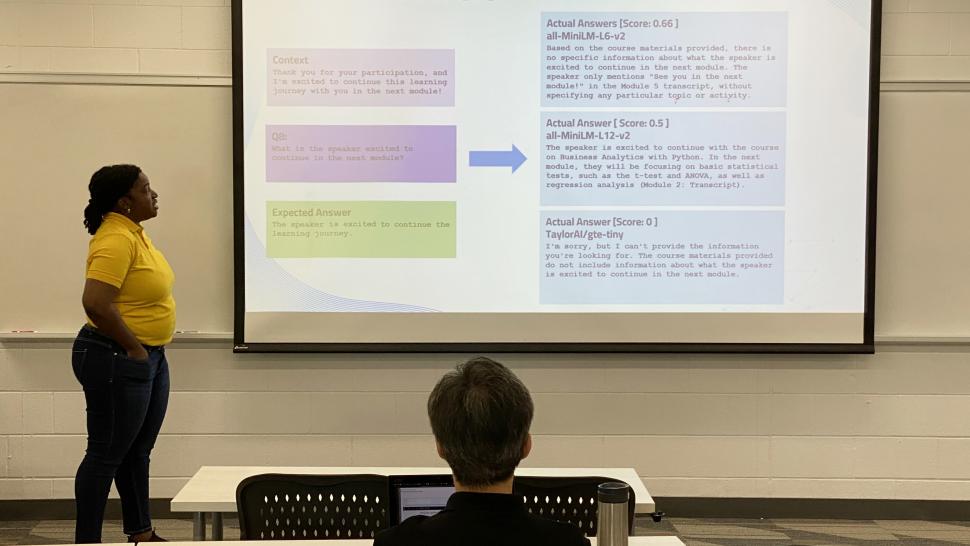
Students in Humber’s Artificial Intelligence (AI) with Machine Learning program are applying what they’ve learned in class in fascinating ways as evidenced by their capstone projects.
Students in the program recently presented their capstones to professor Timothy Wong, who offered his thoughts and advice, and took questions from their peers afterwards.
Each group of students was sponsored by a real-world company or organization that tasked them with solving a problem or challenge they were facing using AI.
Their future careers in the field of AI appear promising based on what they presented.
One group – Simran Dutt Sharma, Dhruv Yadav and Vrishab Bhatt – created an end-to-end diagnostic system for drones designed to free up engineers’ valuable time. Using sensor readings, the AI can check to see if the drone’s flight was normal or if it had any abnormal operations. If it was abnormal, the AI will diagnose and predict where it believes the issue is occurring.
As Sharma noted, engineers can then check that suggested issue rather than having to start the laborious process of trying to first diagnose and then fix the problem.
“When I’m looking for work, this project and what I’ve learned in the course will be helpful,” said Sharma. “I now have a bag of knowledge I can take with me when I leave Humber. I’ve learned a lot that will really help in my future career.”
Wong said AI and machine learning can take vast amounts of data, the gathering of which is commonplace these days, and then present it in a way that’s understandable and provides predictable insights. He added AI is not going away anytime soon.
“There will only be more AI in the future; it’s definitely not a flash in the pan,” said Wong.
Another group – Crystal Francis, Parthiban Kubramani and Oluwaferanmi Akindiilete – created an AI-powered teaching assistant for a learning management system (LMS). The idea is for students to use the teaching assistant chatbot that provides answers to students in a timely manner while freeing up teachers and professors from responding.
A variety of questions can be asked – for example the definition of a term or more information about assignments – and the AI teaching assistant will find and share the answer. Rather than pulling the answers from the internet, it will instead select them from a teacher-approved database so the answers will be accurate and relevant.
Akindiilete said working on the project replicated a real-world work situation and that helped prepare the group for what to expect in their future careers. Akindiilete said going through the development process – from the initial stages to receiving feedback and adjusting to implementation – was extremely beneficial.
“It was a wonderful opportunity that reflected the real-world work experience and that’s super important,” said Akindiilete.
Another group – Anumol Antony and Fathima Maasha Salih – was working on an AI-powered chatbot designed for employers looking to hire from Humber. Instead of having to call or email people, potentially from multiple departments and faculties, AI would be used to look at the job description and then provide a list of the top five Humber programs that match it.
“This capstone was a great way to gain confidence for when we’re working in the industry in the future,” said Antony.
Find out more by visiting the Artificial Intelligence with Machine Learning website.